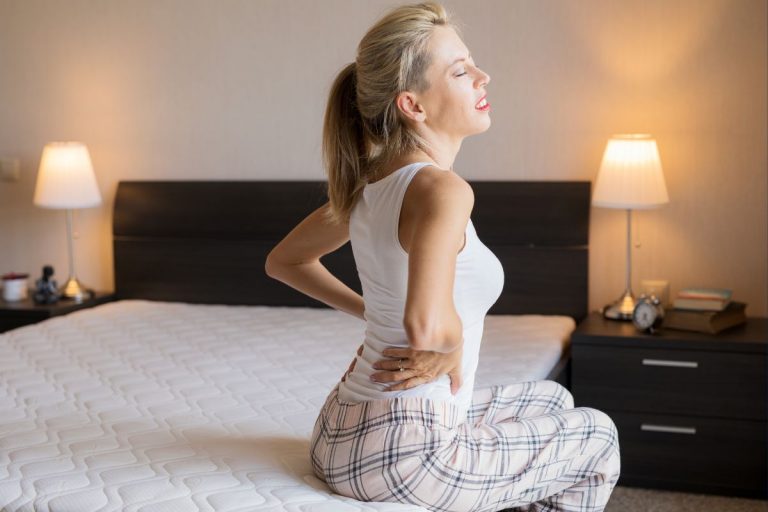The period usually comes unwanted, and it pulls a plethora of many unpleasant symptoms in the process. Our body goes through several physical and hormonal changes to prepare for the beginning of a menstrual cycle. However, for one reason or more, the preparation can be more than painful.
While fatigue before and during period occurs frequently for a lot of women, it would make it easier for a lot of women if they understood what’s happening with their body and how they can use those symptoms in their favor.
What is Menstrual Fatigue?
Menstrual fatigue occurs as a result of hormonal changes during our body, reproductive hormones, particularly. This happens because a menstrual cycle lasts a whole month. At the beginning of a menstrual cycle, ovulation occurs, and estrogen, the main reproductive hormone in women’s peak.
However, as the menstrual cycle is approaching the end and your period is near, estrogen levels will suddenly drop causing a plethora of fatigue symptoms in women. Some of them can include fatigue and drowsiness, while other symptoms could be responsible for headaches, cramps, and even flu-like feeling.
All these combined can make period extremely uncomfortable for women, which leads to overall fatigue. Of course, there are other causes of feeling tired during the period and we’ll discuss them and their solutions below.
6 Causes of Menstrual Fatigue (And How To Fix )
1. Lack of Physical Activity
One of the main causes of menstrual fatigue can happen when you’re living a sedentary office or in-home life with no physical activity whatsoever. When there’s a lack of exercise there could be poor blood circulation which can result in heavier and more drowsy periods.
When there’s a lack of physical activity, there’s also a lack of certain hormones that can reduce fatigue. One of them is serotonin which in great matter affects our mood.
Exercising and working out frequently can stabilize the hormonal imbalances in your body. Exercising can lead to generating more serotonin which is responsible for happiness and controlling moods.
- Avoid exercising late in the night so that you can get plenty of good night’s rest
- If you’re unable to hit the gym and work out regularly, make sure to take walks 30 to 45 minutes a day.
Know More:
2. Not Getting Enough of Good Night’s Sleep
Just like with everything, lack of sleep can lead to several bad health conditions. One of them is heavy, painful, and tiring periods. Sleep helps our muscles and bones regenerate, prepares us for the next day, and balances various hormones.
Not getting enough sleep, which for adults should last anywhere from 7 to 9 hours a night can cause fatigue, daytime sleepiness, and headache. Daytime sleepiness caused by sleep deprivation can lead to accidents, while prolonged sleep deprivation can lead to insomnia.
For periods, lack of sleep can be just as defeating and result in drowsiness, heavier periods. A study found that lack of sleep can affect the premenstrual period.
Induce lifestyle changes that will allow you to get more sleep and maximize your night’s rest.
- Avoid large meals and exercising before bed
- Make a bedtime routine that you will stick to, including sleep and wake up times. On our website, you can find a sleep calculator that will help you calculate the necessary time of sleep to maximize your night’s rest.
- Make sure to sleep in a calm and cool environment where there’s no artificial light or too much noise. If making noise is difficult, make sure to use a white noise machine.
Note: We also recommend you do a sleep cycle test to know the best time to sleep and wake up.
3. Not Drinking Enough of Water
It’s no secret that hydration is one of the most important things we can do for health. Drinking enough of water helps us regulate the toxin levels in our body, it hydrates our organs, bones, and skin and helps with sleep quality (although it’s not recommended to drink it late in the night.)
Drinking enough water during our period helps us deal with cramps, headaches, fatigue, and much more. Drinking water also helps with back pains during the period according to this report.
Not drinking enough of water can lead to dehydration which can worsen the symptoms of the period and make you even more tired in the process. Experts recommend that adults should drink at least eight glasses of water or up to 15 cups.
- Of course, you can make other fluids that will hydrate you, such as lemonade, or some other citrus mix. Many people combine making ginger and lemon juice. They’re also proven remedy against painful periods. Not only they will refresh you, but they’re also rich in vitamin C.
- You can also drink Vitamin C and Zinc supplements dissolved in water to refresh yourself and hydrate.
- There are a lot of apps such as Drink Water that set automatic reminders of when you should drink water or other fluids next based on your weight and other parameters.
Know More: Is It Good To Drink Water Before Sleep?
4. Having Delayed Period
Having a delayed period is a common occurrence at least once per year. Some women can go on for months without getting a period due to seasonal changes or exposure to stress.
Still, it’s important to inform yourself about all the possible underlying conditions that could be associated with the late period, and it doesn’t involve pregnancy.
The delayed period may feel tiring and torturing on your head, causing you to feel exhausted, and even stop you from having a good night’s rest. In some situations, a delayed period can even lead to higher body temperature, which can prevent you from getting good quality sleep.
- If your period is naturally late and you don’t have any hormonal conditions, and you feel tired, try keeping your room at cool temperatures from 65 degrees F to 75 degrees F and see if you can get enough rest.
- Drink a lot of fluids.
- Use period-tracking apps to inform yourself about the time when your period should arrive and use those days to get extra-rest.
- To summon the delayed period drink vitamin C and magnesium supplements or brew parsley tea.
- Don’t drink alcohol.
5. Poor Diet
Regardless of the period, eating at inappropriate times and not getting enough nutritional value out of the food you’re eating can be bad for your health, and cause you to feel exhausted and tired during your period. Additionally, eating a lot of carbohydrates can lead to drowsiness and daytime sleepiness.
Carbs are essential to fuel for our body to burn calories and give us energy throughout the day. However, carbs can burn faster than other nutrients, and when they do, we might be left feeling tired, especially on period.
Don’t forget that women experience huge food cravings a few days before the period starts and during the period. In most cases, PMS (Pre-menstrual syndrome) is to blame. However, it’s important to be mindful and control the cravings, knowing that it’ll help your health.
- Avoid eating carbs in the late evening.
- Eat more protein-rich and vitamin-rich foods.
- Don’t skip meals, make sure to have 3 to 5 meals per day.
- Don’t eat too late in the evening.
- If you think you have a food disorder that affects your period visit a nutritionist or endocrinologist.
- Avoid drinking alcohol.
6. Tampons May Not Work For You
A lot of women use tampons to go on about their day during menstrual bleeding. For a lot of women, tampons are the heroes of their seven day hell. However, for some women, prolonged wearing of tampons can cause both headaches and migraines, while resulting in extreme tiredness.
Experts recommend not wearing tampons for more than 8 hours and using low-absorbency tampons to avoid potentially life-threatening condition known as the toxic shock syndrome.
- Change tampons every 4 to 8 hours.
- Switch back to pads at least when you’re sleeping.
- Use organic tampons such as Oi or Tampax.
- Try using menstrual cup. It’s safe to keep it up to 12 hours.
Also Read: Can You Sleep With Tampon In?
What if there is an Underlying Condition?
Some women experience menorrhagia, a condition that is also called a heavy period. Around 25% of women will seek help regarding heavy periods because it can come with a lot of discomforts, to the point that it may disrupt your daily activities and compromise both physical and mental health. It’s not to be ignored, as it can be the culprit behind extreme tiredness during the period.
If you experience some of these situations or symptoms, you could be suffering from menorrhagia.
- You spend at least one pad or tampon throughout one to two hours because it got soaked.
- Sometimes, you use both pads and tampons because your period is heavy.
- You use two pads to make sure to cover all the spots.
- In the early days of your period, you wake up multiple times per night to change pad or tampon.
- There are large blood clots and discharges.
- You go through heavy cramping, headache, and feel tired and drowsy at all times.
- You can seldom participate in daily activities and sometimes you even have to skip work.
Heavy periods could be the symptom of a more serious condition. Some of them, we’ll list below.
Anemia
Anemia, also known as iron deficiency and red blood cell deficiency can cause menorrhagia, but can also result in painful periods followed by headaches, tiredness, and exhaustion. It often manifests through delayed, missing, or painful periods, while you may feel extremely tired and light-headed a few days before period. Sometimes, you may also experience shortness of breath and irregular heartbeat.
A study has shown that existing anemia condition could affect period in terms of heavy menstrual bleeding and tiredness.
The good news is that anemia can be spotted through a simple blood test and fixed with minimal nutritional changes. Your doctor may also prescribe special medication or supplements to speed up your recovery.
- Make sure to visit the doctor, and get your blood tests done to confirm its presence.
- Eat more protein-rich foods such as chicken, turkey, beef, and fish.
- Eat more green vegetables that are rich in vitamins B6 and B12
- Your doctor will probably prescribe Zinc and Iron supplements
- If you also have a heavy period due to anemia you will also get an additional prescription.
Irregular Thyroid Function
The thyroid is a gland located under your throat and is mainly responsible for controlling metabolic processes in your organism. It produces several hormones that help control the metabolic rate and help our organism function healthy. However, various hormonal balances associated with heavy, painful periods followed by feeling tired can hint at thyroid not working properly.
Sometimes, uncontrollable tiredness can be a result of an underactive thyroid. Such a condition, also known as hypothyroidism can lead to exhaustion and sleep deprivation. Sometimes, you will wake up tired even though you had enough sleep hours. An underactive thyroid is also accompanied by weight gain, depression, and hormonal disbalance.
A study has found that the hypothyroidism can affect the menstrual bleeding and tiredness at a much higher level, although that has already been known since 1950s.
However, hyperthyroidism is a condition where the thyroid is overactive and its extreme hormonal production can also disbalance your periods and make you feel tired.
- Your doctor will conduct several tests that will measure the activity of your thyroid and determine whether you suffer from some of the conditions.
- Natural remedies include lifestyle and dietary changes, as well as getting plenty of sleep.
- Additionally, there will be hormones, and in case of an autoimmune disease such as Hashimoto, there could also be steroid therapies.
If you constantly feel tired due to PMS or during the period, it’s of utmost importance to track your symptoms and discuss them with your doctor.
Sometimes, minor lifestyle changes could lead to vast improvements. However, if there is a serious underlying condition, it’s necessary to identify and address it before it gets more serious and leave a toll on your health.
Know More: Why Am I So Tired All The Time: 10 Possible Reasons And The Solution




